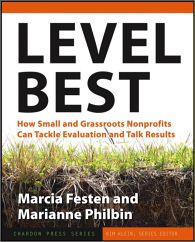Weitere Fachbücher aus dem Fachgebiet:
Gemeinnützige Org., Management & Führung | Gemeinnützige Organisationen, Allg. | Wirtschaft |
|
|
| zurück |
Beschreibung
Level Best offers guidance that demystifies evaluation and takes into account the unique challenges and realities of grassroots nonprofit organizations. It provides a new framework for thinking about evaluation and tools for measuring and sharing results in ways that are practical, efficient, and meaningful.
Veteran authors Marcia Festen and Marianne Philbin break down the evaluation process into five stages--planning, asking, tracking, learning, and using--and show you how to integrate evaluation into your ongoing work. Their approach emphasizes that evaluation at its best is about learning rather than judging and improving rather than proving, and that it is overall an integral part of achieving your mission.
The book draws on the authors' experience with nonprofits, foundations, donors, and boards of directors, and the expertise of evaluation professionals and nonprofit managers. It includes sample forms, checklists, and materials that have been used successfully by real-life organizations, and provides sample meeting agendas that will help you make decisions and move through an evaluation process from start to finish. In easy-to-follow steps, Level Best will help you develop your evaluation plan, gather your data, and use the lessons learned to strengthen your organization and make the best possible case for continued support.
Praise for Level Best
"Level Best not only demystifies the process of evaluation, it offers a reasonable approach that makes sense for programs with limited time, money, or staff to devote to this area."
--Eric Delli Bovi, development director, Old Town School of Folk Music, Chicago, Illinois
"Of all the resources I've consulted on evaluation, Level Best is the most practical, the most readable, and the most supportive. The authors understand not only how great our challenges are, but how little time we have for anything that does not address our real needs--which this book does."
--Ruth Barrett Rendler, deputy director, The Center for Victims of Torture, Minneapolis, Minnesota
"Offers solid guidance, clear direction, and practical applications for effective planning and program development."
--Daranee Petsod, executive director, Grantmakers Concerned with Immigrants and Refugees, Sebastopol, California
"A guide which avoids jargon and overcomplicated systems by simplifying and clarifying the process for smaller and newer groups. It will be a much-used and much-appreciated tool."
--Susannah Quem Pratt, coordinator of evaluation, Lilly Endowment's Religion Division
|
|






 CRISPR-Cas:
CRISPR-Cas: Budding Yeast
Budding Yeast Learning and Memory
Learning and Memory Conservation Science: Balancing the Needs of People and Nature
Conservation Science: Balancing the Needs of People and Nature Introduction to Optical Microscopy
Introduction to Optical Microscopy Organic Chemistry
Organic Chemistry CURRENT PROTOCOLS Wiley USA
CURRENT PROTOCOLS Wiley USA